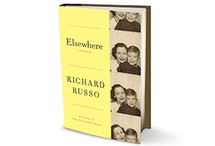
Photo: Philip Friedman/Studio D
14 of 16
Elsewhere
By Richard Russo
256 pages;
Knopf
Summer 1967: Richard Russo loads up his battleship gray Ford Galaxie and sets out for college in Arizona, leaving behind Gloversville, a town in upstate New York that went bust post-WWII, when glove production sailed overseas. Nothing unusual here, except that his mother, Jean, insists on joining him. In Elsewhere, a memoir the Pulitzer Prize-winning novelist wrote after Jean's death from congestive heart failure in 2007, Russo reflects on their complicated relationship and how it shaped him and his work. Jean, a proudly independent single mother raised during the Depression, works for General Electric, dresses like a '50s game show hostess, and raises her only child to read voraciously and excel at school. But through the years, her behavior—mood swings, panic attacks, tremors, accusations, and meltdowns—becomes increasingly erratic. Russo unwittingly allows what he later learns is an undiagnosed mental illness to dominate their lives. For decades he brings his mother, at her request, with him wherever he moves, setting her up in her own apartments, only to watch her bounce back to Gloversville: "No sooner was she elsewhere—anywhere else—than her loathing morphed seamlessly into loss." Russo blames himself for failing to help Jean, even as he recognizes that he has a similar love-hate relationship with his hometown. Though he is unwilling to physically return there, in some ways, like his characters in the fictional towns of Mohawk, Empire Falls, and Thomaston, he has never left: "I simply created other Gloversvilles in my imagination."
— Kristy Davis


